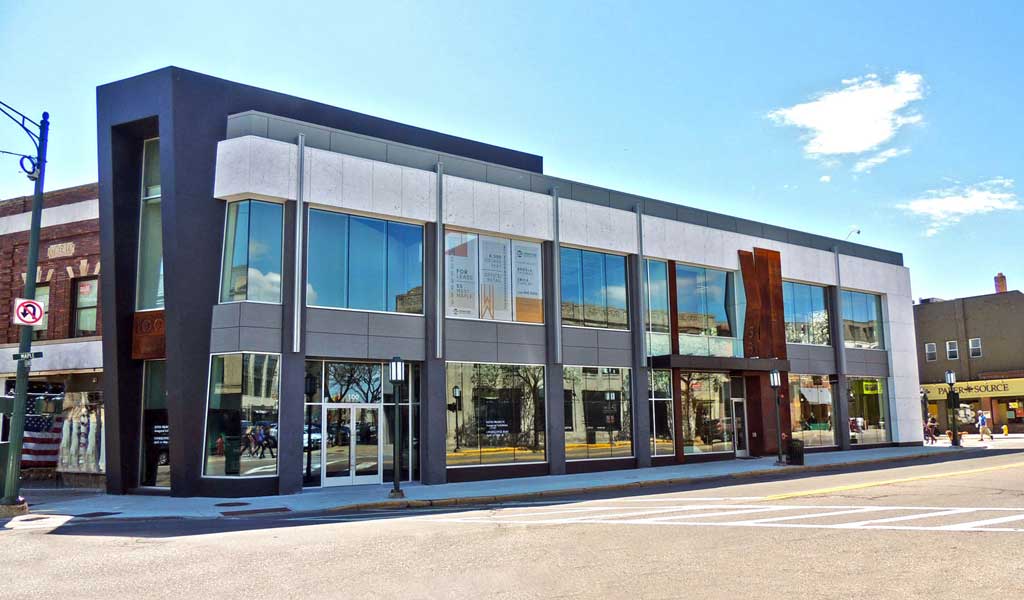
28 Apr Reyes Projects Founder On Opening Detroit-Area Art Space
By Ann Binlot, Forbes Contributer
Detroit is on the rise. That’s the general sentiment of the urbanites who flock there each year. They want the all the benefits of a big city without the costly rents and rat race. There’s also something to be said about living in a city where the creative energy is strong. Terese Reyes, an art dealer who honed her chops in New York at galleries like Andrew Edlin and what is now Marlborough Contemporary, recently made the move to the Detroit area to open Reyes Projects, a 4,600-square-foot contemporary art gallery located in the Wachler Jewelry building on Old Woodward Avenue in Birmingham, Michigan, just a 25-minute drive from Detroit. Reyes Projects opened with the group show developed with artist Scott Reeder titled Undercover Boss — on view through May 26 — which explores the themes of surveillance, labor, privacy, oversharing on social media, the unobtainable balance between work and life and mistaken identity. The exhibition features works by Tony Cox, Greg Fadell, Sadie Laska, Jane Moseley, Jonathan Rajewski, Scott Reeder, Tyson Reeder, and Joe Roberts. I quizzed Reyes on decamping New York for Michigan, opening Reyes Projects and the premise of the inaugural show.
What made you leave New York?
Detroit! I was drawn to the idea of coming to a city that’s experiencing a surge. I feel like I’m in the most exciting part of America right now. New York has become a very rarified place, especially in the art world. And I love it there, but you can get goosebumps here in a way that you can’t in New York. I wanted to be on the ground floor of the culture. And my family is here.
Birmingham, Michigan seems like an odd place to start a gallery. Why did you decide to open your space there instead of Detroit?
Reyes Projects is not the first. I like to think we’re following in the footsteps of a rich tradition in the arts. Susanne Hilberry was a pioneering gallerist based in Birmingham for 40 years, paving the way for contemporary galleries like ours.
How do you plan to make sales when you’re not in a typical destination for collectors?
Well first off, Michigan has a rich collecting community, especially Oakland County (Birmingham, Bloomfield Hills). These are people that travel the world to discover fine art and design. Collectors follow the art, wherever it is. Culture will always function as a cultural oasis—look at the community that rose around Marfa, or Miami Basel. You find that if you have work that you truly love, that speaks to you, that stands out to you, it’s not difficult to sell. That’s the barrier to selling art: your total belief in the work. I could sell these artists from a payphone on the side of the highway. Although I’d prefer not to.
How did you find the space? Why did you choose that space?
We wanted to be in the heart of the city! I was looking for something particular: big, and with the right light. The space you choose for your gallery can elevate the work. I wanted to find a raw space that I could design in the way that I saw fit. The Wachler Jewelry building is a landmark, and I feel it’s special that we can be here, and tailor the space to our needs.
Explain the whole concept of Undercover Boss.
Working with artists directly is a big part of who I am as a person. I like that you can take a concept to an artist, and watch them rise to the challenge. Ideas are their medium, in so many ways. Undercover Boss evolved out of some of the thematic interests you see on the reality TV show, that in an art context are incredibly potent things to think about: surveillance, labor, privacy, oversharing on social media, the unobtainable balance between work and life, and mistaken identity. In fact one artist in the exhibition Scott Reeder is frequently mistaken for bass play from the stoner bands Kyuss and The Obsessed.
What is that whole story with the fake review lines?
The press release is a gag. Another case of mistaken identity. I think the show deals with its heady themes in a way that’s also humorous. That’s what art can do, give a dialogue a new context.
How did you select the artists?
The ethos behind the gallery is creating opportunities for Detroit artists to show and sell their work and be put in context with established and emerging artists from hubs like New York. Of course many of the artists I’m bringing with me are old friends from New York, from when I showed them, or worked with them at Marlborough. To be frank, I picked the artists with the work that I love. The work always comes first.
What are some of the exhibition’s highlights?
Well, I’m particularly excited to be featuring Jonathan Rajewski. He’s from here. The gallery showed him at the Dallas Art Fair, our first art fair, and we sold out the booth in its entirety. Scott Reeder’s also Detroit-based, and has some incredible new roller paintings for the show.
Read the Full Story Here

Sorry, the comment form is closed at this time.